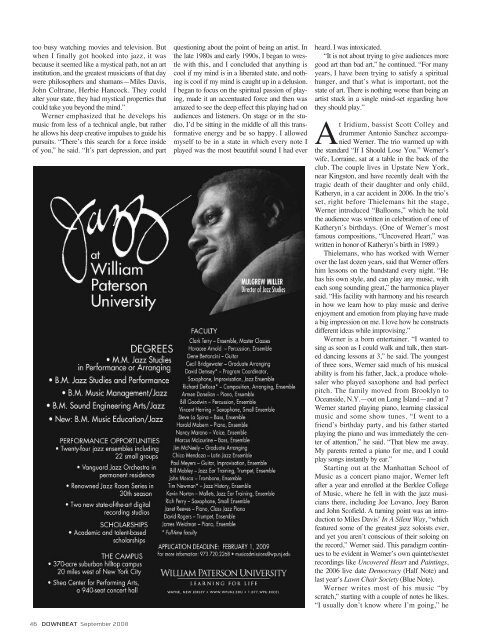Download - Downbeat
Download - Downbeat
Download - Downbeat
You also want an ePaper? Increase the reach of your titles
YUMPU automatically turns print PDFs into web optimized ePapers that Google loves.
too busy watching movies and television. But<br />
when I finally got hooked into jazz, it was<br />
because it seemed like a mystical path, not an art<br />
institution, and the greatest musicians of that day<br />
were philosophers and shamans—Miles Davis,<br />
John Coltrane, Herbie Hancock. They could<br />
alter your state, they had mystical properties that<br />
could take you beyond the mind.”<br />
Werner emphasized that he develops his<br />
music from less of a technical angle, but rather<br />
he allows his deep creative impulses to guide his<br />
pursuits. “There’s this search for a force inside<br />
of you,” he said. “It’s part depression, and part<br />
questioning about the point of being an artist. In<br />
the late 1980s and early 1990s, I began to wrestle<br />
with this, and I concluded that anything is<br />
cool if my mind is in a liberated state, and nothing<br />
is cool if my mind is caught up in a delusion.<br />
I began to focus on the spiritual passion of playing,<br />
made it an accentuated force and then was<br />
amazed to see the deep effect this playing had on<br />
audiences and listeners. On stage or in the studio,<br />
I’d be sitting in the middle of all this transformative<br />
energy and be so happy. I allowed<br />
myself to be in a state in which every note I<br />
played was the most beautiful sound I had ever<br />
heard. I was intoxicated.<br />
“It is not about trying to give audiences more<br />
good art than bad art,” he continued. “For many<br />
years, I have been trying to satisfy a spiritual<br />
hunger, and that’s what is important, not the<br />
state of art. There is nothing worse than being an<br />
artist stuck in a single mind-set regarding how<br />
they should play.”<br />
At Iridium, bassist Scott Colley and<br />
drummer Antonio Sanchez accompanied<br />
Werner. The trio warmed up with<br />
the standard “If I Should Lose You.” Werner’s<br />
wife, Lorraine, sat at a table in the back of the<br />
club. The couple lives in Upstate New York,<br />
near Kingston, and have recently dealt with the<br />
tragic death of their daughter and only child,<br />
Katheryn, in a car accident in 2006. In the trio’s<br />
set, right before Thielemans hit the stage,<br />
Werner introduced “Balloons,” which he told<br />
the audience was written in celebration of one of<br />
Katheryn’s birthdays. (One of Werner’s most<br />
famous compositions, “Uncovered Heart,” was<br />
written in honor of Katheryn’s birth in 1989.)<br />
Thielemans, who has worked with Werner<br />
over the last dozen years, said that Werner offers<br />
him lessons on the bandstand every night. “He<br />
has his own style, and can play any music, with<br />
each song sounding great,” the harmonica player<br />
said. “His facility with harmony and his research<br />
in how we learn how to play music and derive<br />
enjoyment and emotion from playing have made<br />
a big impression on me. I love how he constructs<br />
different ideas while improvising.”<br />
Werner is a born entertainer. “I wanted to<br />
sing as soon as I could walk and talk, then started<br />
dancing lessons at 3,” he said. The youngest<br />
of three sons, Werner said much of his musical<br />
ability is from his father, Jack, a produce wholesaler<br />
who played saxophone and had perfect<br />
pitch. The family moved from Brooklyn to<br />
Oceanside, N.Y.—out on Long Island—and at 7<br />
Werner started playing piano, learning classical<br />
music and some show tunes. “I went to a<br />
friend’s birthday party, and his father started<br />
playing the piano and was immediately the center<br />
of attention,” he said. “That blew me away.<br />
My parents rented a piano for me, and I could<br />
play songs instantly by ear.”<br />
Starting out at the Manhattan School of<br />
Music as a concert piano major, Werner left<br />
after a year and enrolled at the Berklee College<br />
of Music, where he fell in with the jazz musicians<br />
there, including Joe Lovano, Joey Baron<br />
and John Scofield. A turning point was an introduction<br />
to Miles Davis’ In A Silent Way, “which<br />
featured some of the greatest jazz soloists ever,<br />
and yet you aren’t conscious of their soloing on<br />
the record,” Werner said. This paradigm continues<br />
to be evident in Werner’s own quintet/sextet<br />
recordings like Uncovered Heart and Paintings,<br />
the 2006 live date Democracy (Half Note) and<br />
last year’s Lawn Chair Society (Blue Note).<br />
Werner writes most of his music “by<br />
scratch,” starting with a couple of notes he likes.<br />
“I usually don’t know where I’m going,” he<br />
46 DOWNBEAT September 2008
















